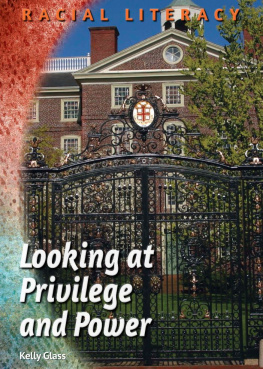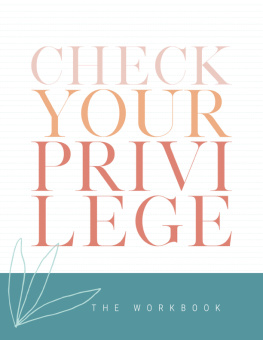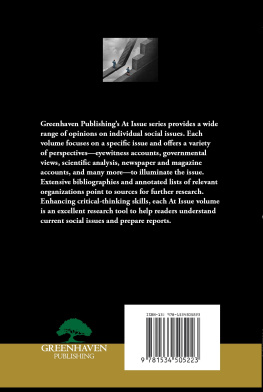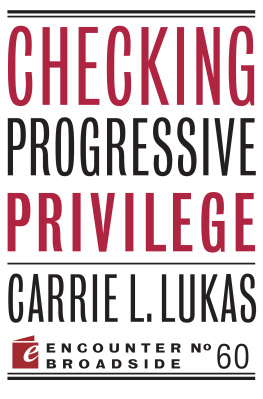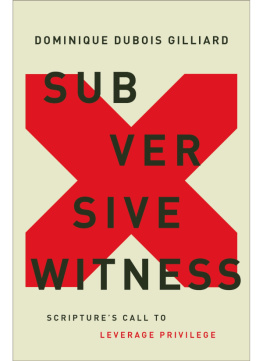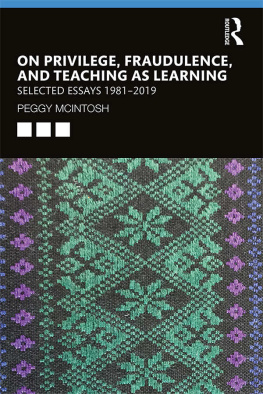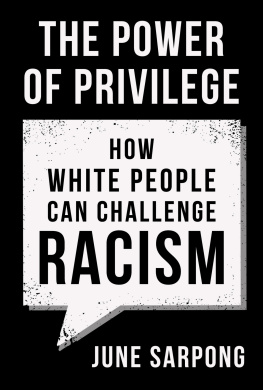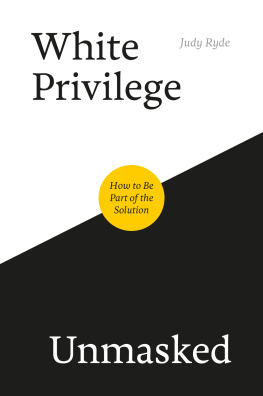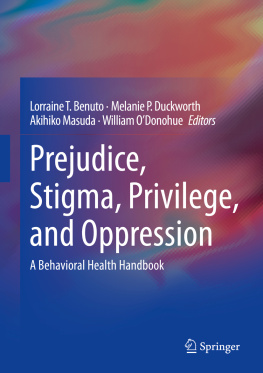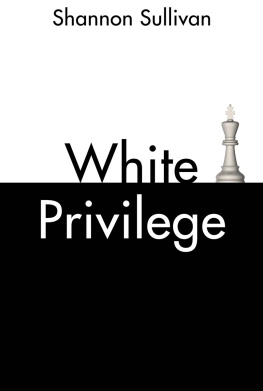Published in 2019 by Enslow Publishing, LLC.
101 W 23rd Street, Suite 240, New York, NY 10011
Copyright 2019 by Enslow Publishing, LLC.
All rights reserved.
No part of this book may be reproduced by any means without the written permission of the publisher.
Library of Congress Cataloging-in-Publication Data
Names: Glass, Kelly, author.
Title: Looking at privilege and power / Kelly Glass.
Description: New York : Enslow Publishing, [2019] | Series: Racial literacy | Audience: Grade 7-12. | Includes bibliographical references and index.
Identifiers: LCCN 2018019106| ISBN 9781978504677 (Library bound) | ISBN 9781978505629 (pbk.)
Subjects: LCSH: Privilege (Social psychology) | Power (Social sciences) | Social justice. Classification: LCC HM671 .G545 2019 | DDC 303.3/72-dc23 LC record available at https://Lccn.Loc.gov/2018019106
Printed in the United States of America
To Our Readers: We have done our best to make sure all website addresses in this book were active and appropriate when we went to press. However, the author and the publisher have no control over and assume no liability for the material available on those websites or on any websites they may link to. Any comments or suggestions can be sent by email to .
Photo Credits: Cover, p. 1 Rick Friedman/Corbis HistoricaL/Getty Images; pp. 6-7 Chip Somodevilla/Getty Images; pp. 10-11 iStockphoto.com/monkeybusinessimages; pp. 12-13, 20 Bettmann/Getty Images; p. 15 Photo Josse/Leemage/Corbis Historical/ Getty Images; p. 18 Ira Berger/ALamy Stock Photo; p. 22 CarL Iwasaki/The LIFE Images CoLLection/Getty Images; pp. 24-25 fizkes/Shutterstock.com; p. 27 Jason Merritt/Getty Images; pp. 30-31 Mark WiLson/Getty Images; p. 33 Radius Images/ALamy Stock Photo; pp. 34-35 iStockphoto.com/Highwaystarz-Photography; pp. 36-37 MichaeLpuche/ Shutterstock.com; p. 39 Ken WoLter/Shutterstock.com; p. 41 makaLex69/Shutterstock. com; pp. 43, 60-61 Andrey_Popov/Shutterstock.com; p. 47 ALex Wong/Getty Images; pp. 50-51 CarL Mydans/The LIFE Picture CoLLection/Getty Images; p. 52 Kevork Djansezian/Getty Images; pp. 54-55 BaLtimore Sun/Tribune News Service/Getty Images; p. 56 Kean CoLLection/Archive Photos/Getty Images; p. 63 CLynt Garnham PubLishing/ALamy Stock Photo; p. 65 Jeanette Dietl/Shutterstock.com; pp. 66-67 RosaIreneBetancourt 13/ALamy Stock Photo; cover and interior pages background design Ensuper/Shutterstock.com (coLors), MiLoje/Shutterstock.com (texture).

Introduction
On February 14, 2018, a nineteen-year-oLd shooter walked into affluent Marjory Stoneman Douglas High School in Parkland, Florida, and opened fire, killing seventeen people and wounding as many. It was one of the worlds most tragic and deadliest school shootings. Of the many things known about the shooter, it was reported that he talked about hating Black people, Mexicans, and gay people. On March 7, 2018, the shooter was indicted on seventeen counts of first-degree murder and seventeen counts of attempted first-degree murder.
The school reopened a couple of weeks later, and safety measures were instituted. Instead of the usual initial grief and brief discussion about solutions to this countrys mass shooting problem, some of the survivors of this historical tragedy made sure this played out a little differently than the shootings before. Emma Gonzalez, Jaclyn Corin, and David Hogg started the #NeverAgain movement-challenging lawmakers to end these mass school murders. They went straight to those in power.
Marjory Stoneman Douglas High School students share the stage with other gun violence survivors at the March for Our Lives rally in Washington, DC, on March 24,2018.
At the March for Our Lives Rally, Hogg called out the media for not giving the Black students a voice. Corin made an even stronger statement when she said, We recognize that Parkland received more attention because of its affluence, but we share this stage today and forever with those communities who have always stared down the barrel of a gun"1
Corin shared her stage, literally and figuratively. She brought Yolanda Renee King, Martin Luther King Jr.s granddaughter, to the stage. They also brought Naomi Wadler, a Black student from Virginia, to speak on behalf of all the African-American girls whose stories dont m a ke th e front pa g e of every national newspaper"2 The conversation spread to a March for Our Lives rally all the way in Chicago, a city plagued with gun violence long before the mass shooting on Valentines Day 2018 in Parkland, Florida. Most Chicago public school students have never felt safe at their schools. The students of Marjory Stoneman Douglas High School in Parkland, Florida, recognized it was the positioning of their school as a predominantly white high school in an affluent area that gave them a platform, and they used that platform to invite people of color to the table. When privilege is used correctly, it is a tool that works to bring diversity, inclusivity, and equality. When used incorrectly, it is a weapon that oppresses. Like any good tool, we must first learn about it what it is, how it works, and what to do with it.
CHAPTER 1
Privilege and Power Explained
Each student in a classroom is given a piece of paper to crumple up. The trash can is positioned in the front of the room, and the teacher explains the game. The class makes up the population of America, and each student has a chance to move up in life by simply tossing the balled-up paper in the bin. The students in the back rows of the class complain about the obvious unfair advantage of their peers near the front of the class, but the students in those front rows just see the wealth and opportunity thats within reach. This anecdotal explanation of privilege gets a lot right about power and privilege.
Those who benefit from privilege are largely unaware or rarely want to admit it. Like the students in the front of the class in the example above, they only see their own starting line and the seemingly attainable goals in front of them. With that perspective, the obstacles in the way of those in the rows behind them seem imaginary. I had to work hard to make that basket. No one helped me. They just need to work harder.
A simple exercise using a waste basket and balled up sheets of paper is a good starting point to begin the conversation about privilege in a classroom setting.
The positioning of the students in the classroom gave some of them an unfair advantage. In this scenario, the students had done nothing in particular to earn a spot at the front of the class. The students in the back of the class hadnt necessarily done anything to deserve being in the back. All students, however, were presented with what seemed to be the same opportunity. In real-world examples of privilege, the obstacles are not placed by one individual person but rather a result of a set of systems put in place to maintain the power the dominant group has established. In America, that dominant group is whites, hence the term white privilege"

